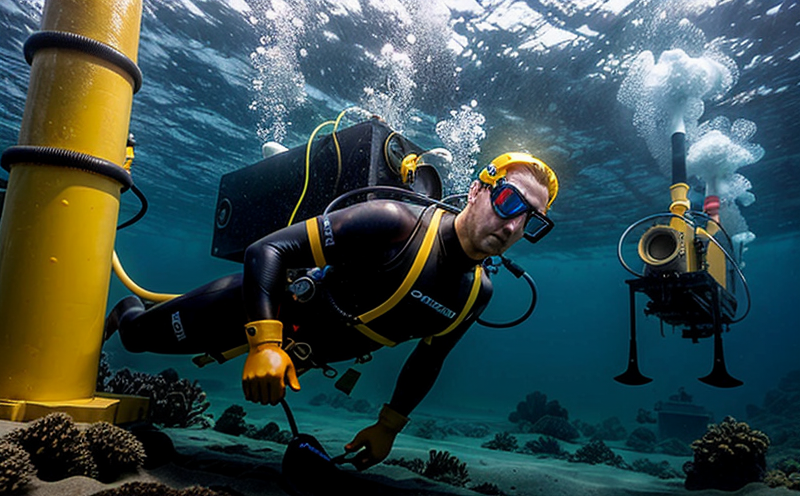API 17D Subsea Wellhead and Christmas Tree Equipment Testing
The API 17D standard is a critical benchmark for ensuring the integrity, reliability, and safety of subsea wellhead and Christmas tree equipment used in offshore oil and gas operations. This testing service is pivotal for quality managers and compliance officers to ensure that all equipment meets stringent requirements set forth by industry standards.
The API 17D test encompasses a series of mechanical and functional evaluations designed to simulate the harsh operating conditions faced by subsea equipment during real-world operations. The testing process involves subjecting the wellhead and Christmas tree assemblies to various stress scenarios that mimic actual drilling, production, and maintenance activities.
The primary objective is to verify that these critical components can withstand the extreme pressures, temperatures, and mechanical loads encountered in deepwater environments without compromising safety or operational efficiency. This testing also ensures compliance with international standards such as ISO 9001 for quality management systems and ISO 14001 for environmental management.
In addition to mechanical tests, functional testing is conducted to ensure that the equipment operates correctly under expected field conditions. This includes flow testing, pressure cycling, and fatigue testing, among others. These tests are essential in validating that the equipment can perform its intended functions reliably over the entire life cycle of an offshore installation.
The comprehensive nature of API 17D testing ensures a robust evaluation of all critical components, including but not limited to blowout preventers (BOPs), safety valves, and other subsea control systems. The stringent criteria applied during this testing process help in identifying any potential weaknesses or failures before the equipment is deployed in operational settings.
For R&D engineers, API 17D compliance offers a pathway to innovate while maintaining safety standards. By adhering to these rigorous tests, manufacturers can introduce new materials and designs that enhance performance without compromising on reliability. This testing process also provides a benchmark for comparing different suppliers' products, ensuring the highest quality components are selected.
For procurement teams, API 17D compliance is essential in sourcing reliable subsea equipment. By specifying this standard as a requirement in tender documents, companies can ensure that only high-quality suppliers meet the necessary safety and performance criteria. This not only enhances operational safety but also contributes to reducing maintenance costs and downtime associated with substandard components.
The API 17D test is conducted using state-of-the-art equipment tailored specifically for subsea operations. Advanced pressure vessels, hydraulic testing rigs, and specialized flow testers are employed to replicate the rigorous conditions found in deepwater environments. This ensures that the tests accurately reflect real-world performance under extreme conditions.
The results of API 17D testing are meticulously documented and reported, providing clear evidence of compliance with industry standards. These reports serve as critical documentation for quality assurance processes and support regulatory submissions when required. The detailed nature of these reports also facilitates ongoing improvement and optimization of equipment design and manufacturing processes.
In conclusion, API 17D subsea wellhead and Christmas tree equipment testing is an essential service that ensures the highest standards of safety and reliability in offshore oil and gas operations. By adhering to this rigorous testing protocol, companies can demonstrate their commitment to operational excellence and regulatory compliance.
Benefits
- Ensures compliance with the highest industry standards
- Reduces risk of equipment failure in critical operations
- Enhances operational safety and reliability
- Sustains regulatory compliance for offshore installations
- Supports continuous improvement of product design and manufacturing processes
Why Choose This Test
- Rigorously simulates the extreme conditions faced in deepwater environments
- Provides comprehensive evaluation of critical components for safety and reliability
- Ensures compliance with international standards, enhancing operational confidence
- Supports quality assurance processes and regulatory submissions
Competitive Advantage and Market Impact
By choosing API 17D subsea wellhead and Christmas tree equipment testing, companies can significantly enhance their competitive edge in the oil and gas industry. This service not only ensures compliance with stringent regulatory requirements but also demonstrates a commitment to operational excellence and safety.
Adhering to these tests can help organizations reduce the risk of equipment failure during critical operations, thereby minimizing downtime and associated costs. The reliable performance of subsea equipment is crucial for maintaining uninterrupted production in offshore installations, which contributes directly to business continuity and profitability.
The stringent nature of API 17D testing also supports continuous improvement initiatives within companies. By identifying potential weaknesses or failures early in the product lifecycle, organizations can optimize their manufacturing processes and introduce innovative solutions that enhance performance without compromising on reliability.
From a market perspective, compliance with industry standards like API 17D is increasingly becoming a differentiator for suppliers. Customers are more likely to trust and choose companies that demonstrate adherence to these stringent testing protocols. This can lead to increased market share and enhanced brand reputation in the competitive oil and gas sector.
In addition, regulatory bodies often favor suppliers who adhere strictly to recognized standards such as API 17D. By ensuring compliance with these standards, companies not only meet but exceed regulatory expectations, further enhancing their credibility and standing within the industry.
Overall, choosing API 17D subsea wellhead and Christmas tree equipment testing is a strategic decision that can significantly impact an organization's competitive position in the oil and gas market. It provides a robust foundation for operational excellence, regulatory compliance, and continuous improvement initiatives.





